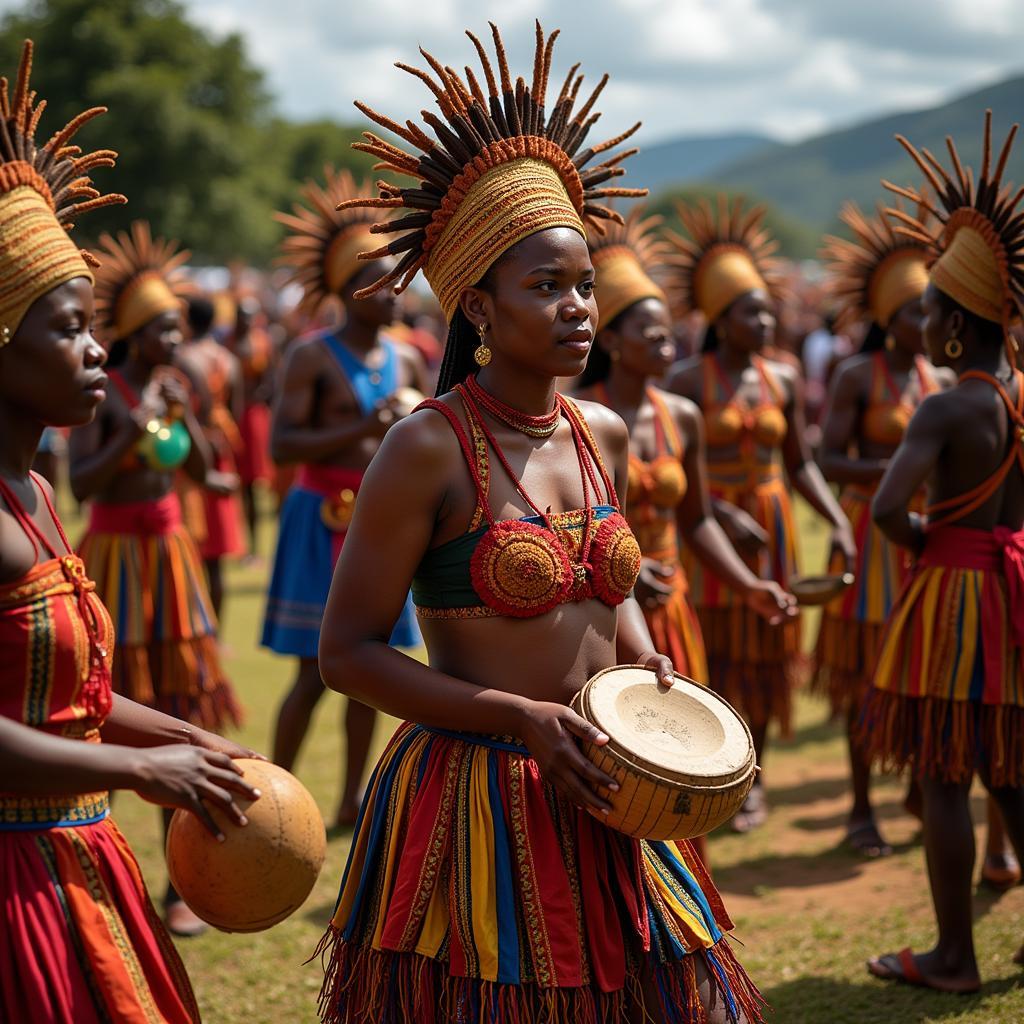Exploring African Conference Dress: A Celebration of Culture and Style
African Conference Dress is more than just attire; it’s a vibrant expression of cultural identity, tradition, and contemporary fashion. From the bold patterns of West Africa to the elegant draping of East Africa, conference attire across the continent reflects a rich tapestry of influences and individual expression. Choosing the right outfit for an African conference is about understanding the context, respecting cultural norms, and showcasing your personal style.
Choosing appropriate attire for an African conference involves considering several factors, from the formality of the event to the specific cultural context of the host country. This entails understanding the nuances of traditional garments, appreciating the evolution of contemporary African fashion, and respecting the significance of clothing within different African societies. For instance, a brightly colored Ankara dress might be perfectly suitable for a conference in Nigeria, while a more subdued and elegant ensemble might be preferred in a North African setting. The key is to research and be mindful of the specific cultural norms. Shortly after this introduction, we’ll delve into more details about regional variations. You might find this similar to preparing for the African Evaluation Association Conference 2019.
Regional Variations in African Conference Dress
Across the diverse landscape of Africa, conference attire reflects the unique traditions and aesthetics of each region. In West Africa, vibrant textiles like Ankara, Kente, and Aso-oke are often incorporated into stylish dresses, suits, and headwraps. These fabrics often feature bold geometric patterns and rich symbolic meaning, making them a powerful statement of cultural pride. East African conference dress often features flowing silhouettes, elegant draping, and intricate beadwork. The kanga, a colorful printed cloth with Swahili proverbs, is a popular choice, often worn as a wrap or incorporated into dresses. North African attire tends towards more modest and conservative styles, often incorporating flowing robes, intricate embroidery, and elegant head coverings.
In Southern Africa, conference dress often reflects a blend of traditional and Western influences. Bold prints, bright colors, and intricate beadwork are common elements, while tailored suits and dresses also feature prominently. Central Africa’s conference attire showcases a diverse range of styles, reflecting the region’s many ethnic groups. From the colorful raffia skirts of the Congo Basin to the embroidered robes of Chad, the region’s conference dress is a testament to its rich cultural heritage. Understanding these regional variations is crucial for choosing appropriate and respectful attire for any African conference.
Navigating the Dress Code: Formal vs. Informal
Just like conferences anywhere else in the world, African conferences can range from highly formal to more relaxed and informal. A formal conference might call for tailored suits, elegant dresses, or traditional attire in luxurious fabrics. For women, this could mean a fitted dress paired with a statement necklace or a sophisticated pantsuit. Men might opt for a well-tailored suit in a classic color or a traditional agbada. An informal conference, on the other hand, allows for more flexibility. This could be a chance to showcase contemporary African fashion, with vibrant prints, comfortable fabrics, and more relaxed silhouettes. However, even in informal settings, it’s important to maintain a professional and respectful appearance.
What are the key considerations for choosing African conference dress? Context, cultural sensitivity, and personal style are paramount. Understanding the specific occasion, the host country’s cultural norms, and your own aesthetic preferences will guide you towards the most appropriate and flattering attire.
Accessorizing Your African Conference Dress
Accessories play a crucial role in completing your African conference look. A carefully chosen headwrap, a statement necklace, or a pair of handcrafted earrings can elevate your outfit and add a touch of personal flair. Traditional jewelry, such as beaded necklaces, bracelets, and earrings, can be a beautiful way to honor local craftsmanship and add a touch of cultural authenticity to your ensemble. However, it’s important to be mindful of the cultural significance of certain accessories and avoid wearing anything that could be considered disrespectful or appropriative. Consider researching the meaning behind different accessories and choosing pieces that complement your outfit while also respecting local traditions. The African Brain initiative highlights the importance of cultural understanding.
African Conference Dress: Embracing Modern Trends
While traditional attire holds a significant place in African conference dress, contemporary African fashion is also making its mark. Many designers are now blending traditional elements with modern silhouettes and innovative techniques, creating unique and stylish pieces that are perfect for conference settings. These contemporary designs often incorporate bold prints, vibrant colors, and unique textures, offering a fresh and exciting take on African fashion. Embracing these modern trends can be a way to express your individuality while still respecting cultural traditions. This might even inspire you to learn more about other topics, like the African Breast Cancer Conference or even the African Independence lesson plan. What is the best way to choose the perfect African conference dress? Researching the specific context of the conference and understanding the local cultural norms is essential for making an informed and respectful choice.
Conclusion: Dressing for Success at African Conferences
Choosing the right African conference dress involves understanding the interplay of culture, tradition, and contemporary style. By considering the context of the event, respecting local customs, and expressing your personal flair, you can create a look that is both professional and culturally appropriate. African conference dress is a celebration of the continent’s rich heritage and its vibrant future, allowing individuals to showcase their personal style while honoring the diverse traditions of Africa. Remember, careful consideration of your attire demonstrates respect for the host culture and contributes to a positive and productive conference experience.
FAQ: Frequently Asked Questions about African Conference Dress
- What is the typical dress code for an African conference? The dress code can vary depending on the specific conference and its location. It’s best to check the conference guidelines or contact the organizers for clarification.
- Can I wear Western-style clothing to an African conference? Yes, Western-style clothing is generally acceptable, especially for more formal conferences. However, incorporating elements of African attire can be a way to show respect for the host culture.
- Where can I find authentic African clothing and accessories? Many local markets and boutiques in African countries offer a wide selection of traditional and contemporary attire. You can also find African-inspired clothing and accessories online.
- Is it appropriate to wear traditional attire from a different African country than the one hosting the conference? While appreciated, ensure the attire is respectful and doesn’t clash with the host country’s customs.
- What should I avoid wearing to an African conference? Avoid anything too revealing or casual. It’s important to maintain a professional and respectful appearance.
- How can I learn more about the cultural significance of African clothing? Research online, visit museums, and engage with local communities to deepen your understanding of African textiles and their cultural meanings. You might even find articles about strains of cannabis like the African Black Strain interesting.
- What are some tips for accessorizing African conference dress? Choose accessories that complement your outfit and reflect the local culture. Be mindful of the cultural significance of certain accessories and avoid anything that could be considered disrespectful.
For further assistance, please contact us:
Phone: +255768904061
Email: [email protected]
Address: Mbarali DC Mawindi, Kangaga, Tanzania
Our customer care team is available 24/7. We are always happy to answer your questions about African culture and attire. You can also find more information on our website.


